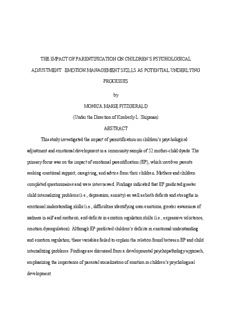
the impact of parentification on children's psychological adjustment PDF
Preview the impact of parentification on children's psychological adjustment
THE IMPACT OF PARENTIFICATION ON CHILDREN’S PSYCHOLOGICAL ADJUSTMENT: EMOTION MANAGEMENT SKILLS AS POTENTIAL UNDERLYING PROCESSES by MONICA MARIE FITZGERALD (Under the Direction of Kimberly L. Shipman) ABSTRACT This study investigated the impact of parentification on children’s psychological adjustment and emotional development in a community sample of 52 mother-child dyads. The primary focus was on the impact of emotional parentification (EP), which involves parents seeking emotional support, caregiving, and advice from their children. Mothers and children completed questionnaires and were interviewed. Findings indicated that EP predicted greater child internalizing problems (i.e., depression, anxiety) as well as both deficits and strengths in emotional understanding skills (i.e., difficulties identifying own emotions, greater awareness of sadness in self and mothers), and deficits in emotion regulation skills (i.e., expressive reluctance, emotion dysregulation). Although EP predicted children’s deficits in emotional understanding and emotion regulation, these variables failed to explain the relation found between EP and child internalizing problems. Findings are discussed from a developmental psychopathology approach, emphasizing the importance of parental socialization of emotion in children’s psychological development. INDEX WORDS: Parentification, Mother-daughter relationship, Emotional development, Emotional understanding, Emotion regulation THE IMPACT OF PARENTIFICATION ON CHILDREN’S PSYCHOLOGICAL ADJUSTMENT: EMOTION MANAGEMENT SKILLS AS POTENTIAL UNDERLYING PROCESSES by MONICA MARIE FITZGERALD B.A., Tulane University, 1994 M.S., University of Georgia, 2002 A Dissertation Submitted to the Graduate Faculty of the University of Georgia in Partial Fulfillment of the Requirements for the Degree DOCTOR OF PHILOSOPHY ATHENS, GEORGIA 2005 © 2005 Monica M. Fitzgerald All Rights Reserved THE IMPACT OF PARENTIFICATION ON CHILDREN’S PSYCHOLOGICAL ADJUSTMENT: EMOTION MANAGEMENT SKILLS AS POTENTIAL UNDERLYING PROCESSES by MONICA MARIE FITZGERALD Major Professor: Kimberly Shipman Committee: Joan Jackson Steven Beach Electronic Version Approved: Maureen Grasso Dean of the Graduate School The University of Georgia August 2005 iv ACKNOWLEDGEMENTS I would like to extend my gratitude and appreciation to several important people who have supported me throughout this process. First, I would like to thank my mentors Kimberly Shipman and Joan Jackson for wholeheartedly supporting my independent research interests and academic pursuits, and for providing a stimulating, collaborative approach to mentorship throughout my training at the University of Georgia. In particular, I thank them for their availability and unstinting guidance along the way. I also want to extend thanks to my colleagues and friends at the University of Georgia for sharing ideas, enthusiasm, and support as invaluable team members. I also thank my close friends near and far who have encouraged and nurtured me from start to finish. I am appreciative and thankful of the financial support provided through the University of Georgia Dean's Award, which made this project feasible, and I would like to thank my committee members for their time and thoughtful feedback. I also thank my conscientious and skilled research assistants. I extend deep appreciation to my husband, Kevin, who has provided me with inspiration, support, and laughter throughout this process. Finally, I would like to thank my parents, Ardell and Michael Fitzgerald, for instilling in me the faith, confidence, and determination necessary to achieve my professional and personal goals. Not to be forgotten is the acknowledgement of the mothers and daughters who participated in this project, for they have allowed us to gain a better understanding of their relationships and life experiences. v TABLE OF CONTENTS Page ACKNOWLEDGEMENTS...............................................................................................iv LIST OF TABLES............................................................................................................vii CHAPTER 1 THE IMPACT OF PARENTIFICATION ON CHILDREN’S PSYCHOLOGICAL ADJUSTMENT: EMOTION MANAGEMENT SKILLS AS POTENTIAL UNDERLYING PROCESSES…………………………………………………...1 Parentification Defined…………………………………………………….3 Parentification: Adaptive or Pathological?...................................................5 The Impact of Parentification on Child and Adult Psychological Adjustment...................................................................................................7 Parentification and Parental Illness and Psychopathology………………..7 Parentification and Divorce………………………………………………10 Parentification and Child Abuse………………………………………….12 Additional Research on Parentification…………………………….…….13 Summary of Parentification Research ...…………………………………18 Conceptual Issues and Definitional Limitations………………………….19 Parentification and Children’s Emotion Management Skills…………….20 Cultural Considerations…………………………………………………..26 vi The Present Study………………………………………………………...27 Hypotheses……..………………………………………………………...28 2 METHOD………………………………………………………………............30 Participants……………………………………………………………….30 Statistical Power………………………………………………………….31 Measures………………………………………………………………….32 Procedure………………………………………………………………....39 3 RESULTS……………………………………………………………………...42 Data Analysis Related to Hypotheses…………………………………….42 Parentification and Child Psychological Adjustment…………………….43 Parentification and Children’s Emotion Management Skills……………..44 Mediational Analyses…………………………………………………….47 4 DISCUSSION…………………………………………………………………...54 Parentification and Child Psychological Adjustment……………………54 Emotional Parentification and Children’s Emotion Management Skills…58 Mediation………………………………………………………………...64 Limitations and Future Research Directions……………………………..65 Implications for Intervention……………………………………………..67 REFERENCES…………………………………………………………………………...69 APPENDIX A……………………………………………………………………………87 APPENDIX B…………………………………………………………………………...112 vii LIST OF TABLES Table Table 1: List of Study Measures Per Construct.............................................................................40 Table 2: Descriptive Statistics and Values of Coefficient Alpha for Scale Scores.......................51 Table 3: Intercorrelations for All Study Variables………………………………………………52 1 CHAPTER 1 The Impact of Parentification on Children’s Psychological Adjustment: Emotion Management Skills as Potential Underlying Processes Parentification is the process by which a child or adolescent prematurely fulfills parental roles and assumes responsibility for the physical and/or emotional needs of other family members (Chase, 1999; Jurkovic, 1997). Within the context of parentification, children’s contributions to the family often are developmentally inappropriate, unacknowledged, and taxing on their capabilities (Chase, 1999, 2001; Jurkovic, 1997). Research documents a link between parentification and a number of adverse short-term and long-term psychosocial consequences for children and adults (e.g., depression, anxiety, low self-esteem, impaired academic performance, somatic/health problems, and interpersonal difficulties; Earley & Cushway, 2002; Jurkovic, 1997, 1998). Clinical literature suggests that emotional parentification (i.e., parents seeking emotional caretaking from their children) may have the most detrimental impact on children’s socioemotional functioning (Jurkovic, 1997; Jurkovic, Jessee, & Goglia, 1991). More specifically, when children are consistently thrust into the roles of comforter, protector, confidante, problem-solver, and/or mediator for distressed parents, this process is likely to interfere with children’s healthy emotional development and lead to significant child distress (e.g., feelings of anxiety, responsibility, numbing, depression). No known research has focused on the potential impact of parentification on children’s emotional development. Research has, however, identified certain emotion management skills that underlie competent emotional functioning and promote psychosocial and physical health
Description: